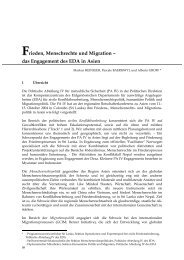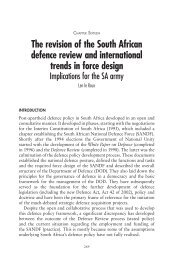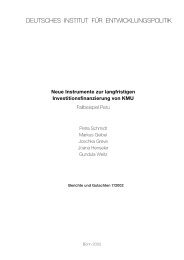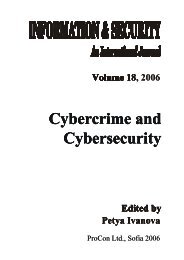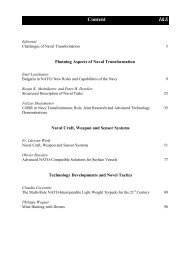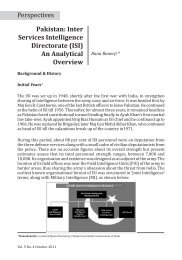Andreas Stamm Eva Dantas Doris Fischer Sunayana ... - ETH Zürich
Andreas Stamm Eva Dantas Doris Fischer Sunayana ... - ETH Zürich
Andreas Stamm Eva Dantas Doris Fischer Sunayana ... - ETH Zürich
You also want an ePaper? Increase the reach of your titles
YUMPU automatically turns print PDFs into web optimized ePapers that Google loves.
<strong>Andreas</strong> <strong>Stamm</strong> et al.<br />
ades, the fast development of CCS (carbon capture and storage) technologies seems to be<br />
a clear imperative that could call for a well-coordinated and -funded global mission involving<br />
all R&D and innovation actors that may be able to provide the knowledge and<br />
expertise required to enable a quick technological breakthrough.<br />
In any case, providing the required decoupling solutions calls for new and concerted international<br />
action in science, technology and innovation, clearly not limited to the industrialised<br />
countries of the North but also involving actors in the developing world, and here first<br />
of all anchor countries that have accumulated technological capabilities and are striving to<br />
catch up technologically with the OECD world.<br />
How global sustainability challenges can be addressed by national and multilateral innovation<br />
policies is still a largely open question. This can partly be explained by a failure of the<br />
research community to adequately inform policy makers. This, in turn, is largely due to a<br />
division of the research community as such into those researchers that deal with technological<br />
innovation and innovation systems on the one hand and those that deal with environmental<br />
challenges and the effectiveness of environmental policies on the other:<br />
— Innovation (system) research, on the one hand, has for too long largely neglected the<br />
pressing challenges of sustainable development, essentially limiting the scope of research<br />
to the features of innovation systems that contribute to the competitiveness of<br />
national economies, mainly in advanced industrialised economies.<br />
— Researchers concerned with the preservation of the global environment, on the other<br />
hand, have largely ignored the potential power of technological innovations for reconciling<br />
the need to satisfy socio-economic needs with need to preserve global ecosystems.<br />
Far too often, the discourse has centred on possible threats that specific technologies<br />
(such as genetic engineering) may imply for ecosystems.<br />
In Chapter 5 of this paper, we outlined a rather challenging research agenda that might<br />
provide answers to the question how economic growth and social progress might be decoupled<br />
from environmental pressures, especially in anchor countries. Carrying out this<br />
research agenda will make it necessary to bring together three research and discourse<br />
communities, namely IS researchers with researchers dealing with the mitigation of environmental<br />
problems and, finally, the development research community.<br />
— IS research can explain how technological and innovation capabilities within a sector<br />
or country are shaped through the interplay of actors from the private and the public<br />
sector, governed by rules and regulations largely influenced by policies.<br />
— Environment-related research can shed light on what the most pressing challenges are<br />
in relation to the environmental dimension of sustainability and thus also in the areas<br />
in which technological solutions would be essential to mitigate them.<br />
— Development research can contribute knowledge regarding the level of complexity at<br />
which the development and deployment of environmentally sound technologies has to<br />
be conceptualised - at the micro-level of the firm or local community, at the mesolevel<br />
of organisations, at the macro-level of policies and polities, and finally at the<br />
meta-level of the rules and norms prevalent in a given developing society.<br />
While the links between the environmental and development communities are relatively<br />
firm, and some links exist between the IS and development communities, the main challenge<br />
seems to lie in bringing, first, the environmental and IS communities and then all<br />
three communities together with a view to exploiting the synergies between them.<br />
38<br />
German Development Institute / Deutsches Institut für Entwicklungspolitik (DIE)






